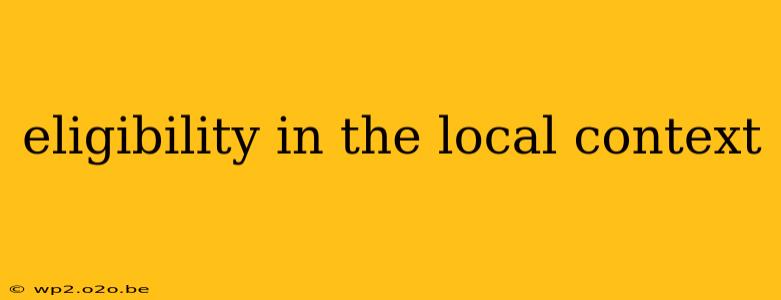Eligibility, a seemingly simple concept, transforms into a complex web when viewed through the lens of local contexts. This is because eligibility criteria – whether for voting, social programs, licenses, or even community events – are deeply influenced by local laws, regulations, and cultural norms. Understanding these nuances is crucial for ensuring fair access and preventing exclusion. This post delves into the multifaceted nature of eligibility within specific geographic locations, exploring its implications and challenges.
Defining "Local Context" in Eligibility Determination
Before diving into specifics, it's essential to define what we mean by "local context." This encompasses several key elements:
-
Jurisdictional Boundaries: Eligibility often hinges on geographic boundaries. Are you eligible for a specific program within a city, county, state, or nation? These boundaries dictate which set of rules applies.
-
Legal Frameworks: Local, state, and national laws profoundly shape eligibility criteria. These laws may vary significantly, leading to differences in requirements even for similar programs or services.
-
Cultural Norms and Practices: While often unspoken, cultural norms can subtly influence eligibility. Certain communities may have unwritten expectations or informal practices that affect who is considered eligible for particular opportunities.
-
Administrative Procedures: The way eligibility is determined can vary widely depending on the administrative processes of the organization or government body involved. This includes application procedures, documentation requirements, and decision-making processes.
Examples of Eligibility in Different Local Contexts
Let's examine a few examples illustrating how local context significantly affects eligibility:
1. Voting Eligibility:
Voting eligibility varies considerably across the globe. While many countries grant suffrage to citizens above a certain age, specific requirements regarding residency, criminal history, or mental capacity can differ drastically. For instance, some localities may have stricter residency requirements than others, effectively disenfranchising individuals who recently moved to the area.
2. Social Welfare Programs:
Access to social safety nets, such as unemployment benefits, food assistance, or housing subsidies, is often contingent on local regulations. Income thresholds, residency durations, and specific qualifying events (e.g., job loss, disability) are all defined by local and national laws. Moreover, the administration of these programs – the ease of application, the level of support provided during the application process, and the speed of processing – can significantly affect accessibility.
3. Business Licenses and Permits:
Obtaining licenses to operate a business is subject to a myriad of local regulations. These may include zoning laws, health and safety codes, environmental regulations, and specific requirements for certain types of businesses. Navigating these local regulations can be challenging for entrepreneurs, potentially creating barriers to entry and economic participation.
Challenges and Implications of Varying Eligibility Criteria
Inconsistencies in eligibility criteria across different localities can lead to several significant challenges:
-
Inequity and Disparities: Variations in eligibility rules can exacerbate existing inequalities, disproportionately affecting marginalized communities who may lack the resources or knowledge to navigate complex regulations.
-
Limited Access to Resources: Individuals who meet the criteria in one location may be ineligible in another, resulting in limited access to essential services or opportunities.
-
Administrative Burden: Managing diverse eligibility criteria across different jurisdictions can create a significant administrative burden for both government agencies and service providers.
-
Lack of Transparency: Unclear or complex eligibility rules can lead to confusion and frustration, hindering access to needed resources.
Conclusion: Promoting Equity and Inclusivity
Understanding the complexities of eligibility in local contexts is crucial for creating more equitable and inclusive societies. Efforts to streamline eligibility processes, enhance transparency, and provide support to individuals navigating these systems are essential for ensuring fair access to vital resources and opportunities for all members of the community. Transparency, clear communication, and community engagement are vital steps in addressing these challenges and fostering a more inclusive society. Further research into specific local regulations and ongoing dialogue with community stakeholders is needed to effectively navigate this complex landscape.

